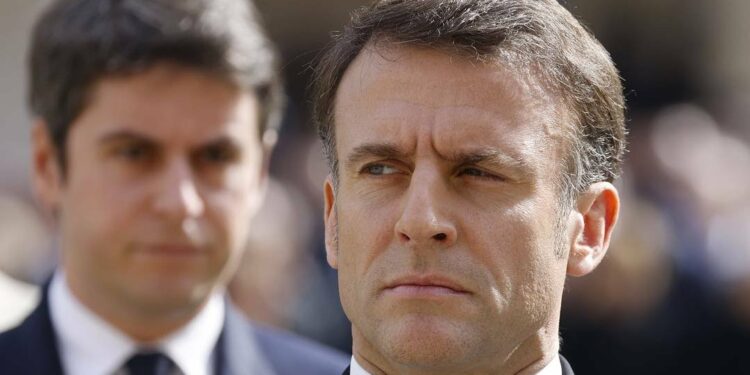France President, Emmanuel Macron, declined to accept the resignation of Prime Minister Gabriel Attal, requesting that he stay on temporarily amid the chaotic election results that left the government in limbo.
France voters split their support across the left, center, and far right, leaving no faction near the majority needed to form a government, potentially leading to paralysis for the European Union’s second-largest economy.
Macron had hoped that calling snap elections would provide clarity, but the results indicated otherwise, coming just weeks before the Paris Olympics.
France’s main share index briefly dipped but quickly rebounded, as markets had feared a more decisive victory for the far right or the leftist coalition.
Prime Minister Attal, who expressed his willingness to remain in office if necessary, offered his resignation on Monday morning.
Macron, who appointed him only seven months ago, asked him to stay on “to ensure the stability of the country.”
A meeting at the presidential palace with Macron’s top political allies and Attal lasted about 90 minutes.
Attal had voiced disagreement with Macron’s decision to call the snap elections, which resulted in a fragmented legislature with no clear path to government formation for the leftist coalition that came in first, Macron’s centrist alliance, or the far-right faction.
Over 50 countries are set to hold elections in 2024, a year that will challenge even the most robust democracies.
Newly elected and returning lawmakers were expected to convene at the National Assembly to start negotiations in earnest, while Macron prepared to leave midweek for a NATO summit in Washington.
The political deadlock in France could have significant implications for the war in Ukraine, global diplomacy, and Europe’s economic stability.
Former European Union Council head, Donald Tusk, remarked on the election results, saying, “In Paris enthusiasm, in Moscow disappointment, in Kyiv relief. Enough to be happy in Warsaw.”
Official results early Monday showed all three main blocs fell far short of the 289 seats needed to control the 577-seat National Assembly.
The New Popular Front leftist coalition led with over 180 seats, ahead of Macron’s centrist alliance with more than 160 seats.
Marine Le Pen’s far-right National Rally, although in third place, secured more than 140 seats, a significant increase from their previous best of 89 seats in 2022.
With three years remaining in his presidential term, Macron faced a populace using the vote to express dissatisfaction with issues like inflation, crime, immigration, and his governing style.
The New Popular Front leaders immediately called on Macron to allow them the first opportunity to form a government and propose a prime minister, aiming to reverse many of Macron’s key reforms and implement extensive public spending.
However, it remains unclear who could lead the government without alienating essential allies.
Head of the Socialist Party within the leftist coalition, Olivier Faure, emphasized the need for a consensus-building leader.
Macron warned that the left’s proposed economic policies could be financially disastrous for France, already under scrutiny from EU watchdogs for its debt.
The political uncertainty, unprecedented in modern France, left many citizens feeling a mix of relief and anxiety.
A legal secretary in Paris, Nadine Dupuis, expressed both relief and high expectations for how the country would be governed moving forward.
The election results, while blocking the National Rally from power, left some far-right supporters disappointed but optimistic about their progress. Marine Le Pen, eyeing another presidential run in 2027, saw the elections as laying the groundwork for future victory.
The campaign was marred by racism, antisemitism, Russian disinformation, and unusual physical attacks on over 50 candidates.
Unlike other European countries accustomed to coalition governments, France’s centralized political system does not traditionally foster cross-party alliances.
The political agreement to block the National Rally was effective, with many voters prioritizing this over backing their usual political camps.
Far-right supporter Luc Doumont noted a sense of disappointment but acknowledged the party’s progress. Le Pen viewed the elections as a step toward future success, despite the setbacks.













